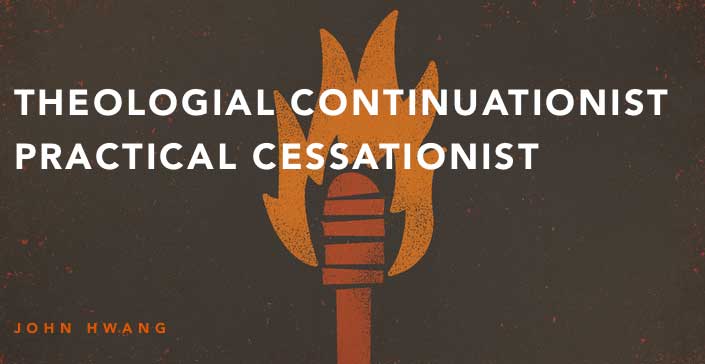
Theologically, we are Continuationists. We believe that all the Spiritual gifts mentioned in the New Testament still exist and operate among Spirit-filled Believers today. Practically, however, do we act like Cessationists? I recently taught at a Calvary Chapel Worship Leader’s Conference, and in the course of the evening God directed us into a sweet time of responsive worship. As we ministered to the Lord, people experienced a fresh filling of God’s Spirit and the manifestations of Spiritual gifts, such as “prophecy”, “tongues”, and “interpretation of tongues”. There was no hype, manipulation, nor worked-up frenzy; there was just a flowing current of God’s guidance, and a real sense of God’s presence that couldn’t be manufactured. 1 Corinthians 12-14 became more real for many in attendance as spiritual gifts were exercised, Biblical instructions were followed, Believers were edified, and Christ was exalted. When the service ended, a young woman came to me with tear-filled eyes, and said, “I am so thankful, and encouraged by what happened tonight. I thought Calvary Chapel no longer believed that spiritual gifts, such as ‘tongues’, continued today.” She went on, “I have been a member in our church for many years, and I usually hear our pastor speak about ‘tongues’ as something only weird people do.” I do not know the context of this pastor’s statement, nor do I hold that this is the general consensus among Calvary Chapels; I do feel, however, that this discussion of belief and practice needs to be revisited. There should be agreement between our theological AND practical Pneumatology. Obviously, all the issues cannot be covered in an article that is limited to 700 words (though I may stretch this number a bit); I can, however, try to get the conversation started by sharing some thoughts about how we fuse doctrine and deed together at Calvary Chapel of Costa Mesa (where I serve as an assisting pastor).
Sunday Night “Acts 2:42”
In January 2014, we began a new format for our Sunday evening service called “Acts 2:42”. The aim is to engage in the Apostles’ doctrine, prayers, breaking of bread, and fellowship in a 2-hour worship service. It generally goes as follows:
1. Praise & Worship
2. Personal Testimony: Real life Gospel-stories of redemption and regeneration
3. Corporate prayer
4. Expositional Bible study
5. Responsive worship & Communion
6. Fellowship
In each gathering, we remain submitted to God’s leadership, being open to whatever He wants to do in and through us. We see God’s people functioning like members of Christ’s body, and this includes the operating of Spiritual gifts. This “Believer’s Meeting” provides a time and place for Christians to be something more than just spectators; they are participants. We see God’s Spirit moving encouraging, edifying, equipping, and empowering His church. There is the demonstration of speaking gifts (“teaching”, “prophecy”), serving gifts (“ministry”, “helps”), and on occasion, sign gifts (“tongues”, “interpretation of tongues”, “healings”) among us. In the end, Christ is glorified and Believers are edified.
Prophecy
Whenever we gather, we want to hear from God. “Prophecy” generally happens when God’s word is being preached and expounded from our pulpits. Yet, in designated times of corporate worship (such as “Acts 2:42”), we receive prophetic words from members in our church congregation. The overseeing pastor provides Biblical instruction, clearly explaining the guidelines set-forth in 1 Corinthians 14:29-33. People are encouraged to speak only if he really believes that God has given him a prophetic word that is to be shared with the entire church. When he speaks, he must do so in turn: “For you can all prophesy one by one” (1 Corinthians 14:31). The spoken word is then subject to testing: “Let two or three prophets speak, and let the others judge” (1 Corinthians 14:29). The pastor instructs the congregation to prayerfully discern whether the word is really from God or not. If it is, we all agree with, “Amen”. If not, we disregard it. On the occasion, if someone speaks a false word, the pastor brings a gentle, yet firm, correction, directing the church to God’s revealed truth in Scripture. When “prophecy” happens God’s way, Believers are built-up, encouraged, and comforted (1 Corinthians 14:3). Therefore, “Do not quench the Spirit. Do not despise prophecies, but test everything; hold fast what is good” (1 Thessalonians 5:19-21).
Tongues and Interpretation of Tongues
During an “Acts 2:42” service, a young man humbly spoke a short prayer in “another tongue”. A woman then followed, providing the interpretation. Two other people in the church validated what she said; these had the same interpretation. We do not discourage people from “speaking in other tongues”, but at the same time, we want this gift exercised the right way in corporate worship. We permit three at most, and each in turn. Each “tongue” must be followed by its interpretation. If there is no interpretation, then we do not allow the public speaking in “tongues” during the remainder of the service. We want to do our best in applying 1 Corinthians 14:27-28: “If any speak in a tongue, let there be only two or at most three, and each in turn, and let someone interpret. But if there is no one to interpret, let each of them keep silent in church and speak to himself and to God.”
Closing Thought
The best thing I can end with is by encouraging you to read 1 Corinthians 12-14 and let God’s Spirit lead you in the application of it in “your gathering together”. God grants Spiritual gifts for our edification, and we see real spiritual growth happen when these gifts are exercised the right way. He wants this for us. He wants this for our churches. God’s Spirit was moving in supernatural ways in the Book of Acts, and He is still moving today.









